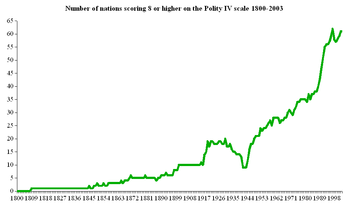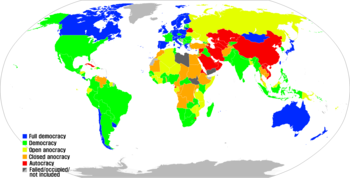
Back مجموعه دادههای پلیتی Persian Données polity French Polity IV Russian Polity IV SIMPLE 政體資料集 Chinese


The Polity data series is a data series in political science research.[1][2][3] Along with the V-Dem Democracy indices project and Democracy Index (The Economist), Polity is among prominent datasets that measure democracy and autocracy.[4][5][6][7][8]
The Polity study was initiated in the late 1960s by Ted Robert Gurr and is now continued by Monty G. Marshall, one of Gurr's students. It was sponsored by the Political Instability Task Force (PITF) until February 2020.[9] The PITF is funded by the Central Intelligence Agency.[10]
The data series has been criticized for its methodology, Americentrism, and connections to the CIA. Seva Gunitsky, an assistant professor at the University of Toronto, stated that the data series was appropriate "for research that examines constraints on governing elites, but not for studying the expansion of suffrage over the nineteenth century".
- ^ Casper, Gretchen, and Claudiu Tufis. 2003. "Correlation Versus Interchangeability: the Limited Robustness of Empirical Finding on Democracy Using Highly Correlated Data Sets." Political Analysis 11: 196-203.
- ^ "Despite global concerns about democracy, more than half of countries are democratic". Pew Research Center. Retrieved 2021-07-16.
- ^ Hensel, Paul R. (2010). "Review of Available Data Sets". Oxford Research Encyclopedia of International Studies. doi:10.1093/acrefore/9780190846626.013.418. ISBN 978-0-19-084662-6. Retrieved 2021-07-16.
- ^ Högström, John (2013). "Does the Choice of Democracy Measure Matter? Comparisons between the Two Leading Democracy Indices, Freedom House and Polity IV". Government and Opposition. 48 (2): 201–221. doi:10.1017/gov.2012.10. ISSN 0017-257X. S2CID 19290786.
- ^ Coppedge, Michael; Lindberg, Staffan; Skaaning, Svend-Erik; Teorell, Jan (2016). "Measuring high level democratic principles using the V-Dem data". International Political Science Review. 37 (5): 580–593. doi:10.1177/0192512115622046. hdl:2077/38971. ISSN 0192-5121. JSTOR 26556873. S2CID 142135251.
- ^ Pelke, Lars; Croissant, Aurel (2021). "Conceptualizing and Measuring Autocratization Episodes". Swiss Political Science Review. 27 (2): 434–448. doi:10.1111/spsr.12437. ISSN 1662-6370.
- ^ Vaccaro, Andrea (2021-03-16). "Comparing measures of democracy: statistical properties, convergence, and interchangeability". European Political Science. 20 (4): 666–684. doi:10.1057/s41304-021-00328-8. ISSN 1682-0983.
- ^ Boese, Vanessa A (2019-06-01). "How (not) to measure democracy". International Area Studies Review. 22 (2): 95–127. doi:10.1177/2233865918815571. ISSN 2233-8659. S2CID 191935546.
- ^ "Polity". Polity. 2021. Archived from the original on 2021-01-26. Retrieved 16 July 2021.
- ^ Polity IV Country Report 2010: Canada http://www.systemicpeace.org/polity/Canada2010.pdf
© MMXXIII Rich X Search. We shall prevail. All rights reserved. Rich X Search